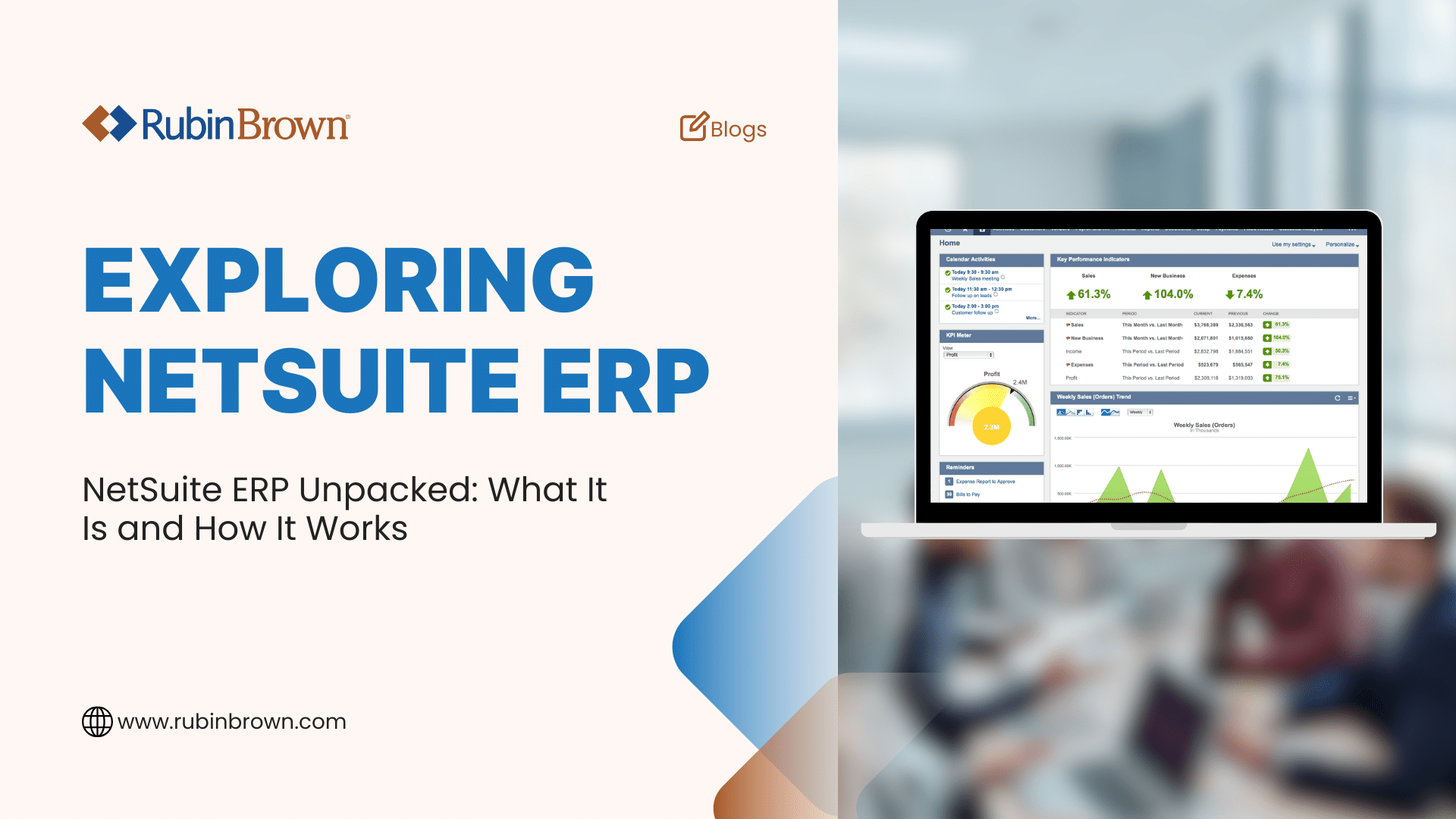Oracle Fusion Cloud ERP Overview: Everything You Need to Know
Oracle continues to set the standard for enterprise software, recently being named a Leader in the 2025 Gartner® Magic Quadrant™ for Cloud ERP for...
In a time where digital advancements influence the rate of business expansion, choosing the right cloud-based business management platform is crucial. That's where NetSuite comes into play. As a leading software giant, Oracle's NetSuite has revolutionized how businesses operate, offering a one-stop cloud solution that integrates all core business functions—finance, inventory, CRM, HR, and more—into a single, cohesive system.
This guide thoroughly examines why NetSuite is a crucial tool for more than 37,000 organizations globally. It highlights NetSuite's powerful ERP system that efficiently manages key operations and its SaaS model that guarantees simplicity and ongoing innovation. But what is NetSuite, and how can it benefit your business? Regardless of being a small business owner starting to grow or an experienced executive in a large company, knowing NetSuite's functions, features, and pricing is essential.
We'll explore the ins and outs of NetSuite: its key features, how it works, the transformative impact it can have on your business operations, and what you can expect from implementing this powerful platform. Additionally, we'll provide insights on selecting the right NetSuite partner to ensure a smooth transition and ongoing success. So, buckle up as we take you through everything you need to know about Oracle NetSuite, your future business catalyst.
TL;DR:
NetSuite, by Oracle, is a comprehensive cloud-based business management platform designed to streamline operations, enhance efficiency, and drive growth for organizations of all sizes. Offering a suite of integrated applications for ERP, CRM, HR, and more, NetSuite allows businesses to operate on a global scale with ease and precision. This guide covers its core features, operational mechanics, transformative potential, and tips on choosing the right implementation partner, providing you with a roadmap to leveraging NetSuite for your business's success.
Oracle NetSuite stands at the forefront of cloud-based business management solutions, offering an unparalleled suite that integrates ERP, CRM, and E-commerce functionalities. This comprehensive platform is designed to streamline key business processes, enhance efficiency, and reduce costs, making it a favored choice for over 37,000 growing businesses worldwide. Its robust ERP system centralizes critical operations such as finance, inventory, and order management, while its scalability accommodates additional modules for CRM, HR, PSA, and omnichannel commerce, catering to a wide range of business needs.
As a Software as a Service (SaaS) offering, NetSuite delivers its powerful capabilities through the cloud, relieving customers of the burdens associated with managing infrastructure. This includes the avoidance of expenses related to hardware acquisition, software installation, and ongoing maintenance, thanks to Oracle NetSuite's responsibility for software updates and infrastructure management. The biannual software updates ensure that businesses always have access to the latest features and security enhancements.
NetSuite's pioneering 'born in the cloud' approach, since its inception in 1998, has solidified its position as one of the de-facto leaders in the cloud ERP space. Unlike traditional ERP systems that were adapted to the cloud, NetSuite was intentionally designed for cloud delivery, providing inherent benefits in accessibility, scalability, and performance.
Oracle NetSuite comes with a range of key features that make it a powerful solution for businesses. These features include advanced financial management capabilities, real-time analytics and reporting, customizable dashboards, inventory management, order management, and CRM integration. With these features, businesses can effectively manage their finances, make data-driven decisions, and streamline their operations. Here are some of the core features of NetSuite:
Financial Management: NetSuite's financial management solution streamlines bookkeeping tasks by automatically updating the general ledger, monitoring accounts receivable and payable, and managing invoicing. This feature accelerates monthly closing procedures and simplifies the generation of crucial financial reports for regulatory and statutory compliance. It accommodates complex revenue recognition standards and seamlessly consolidates financial statements from subsidiaries, even those in different countries, with real-time currency conversion capabilities.
Analytics: SuiteAnalytics leverages the wealth of data within the NetSuite platform to offer in-depth insights, spanning from high-level summaries to granular transaction details. With the SuiteAnalytics workbook, users can enhance saved searches and reports through personalized filters and visually appealing visualizations. This user-friendly tool allows employees to swiftly find answers to critical questions using intuitive drag-and-drop features, eliminating the need for intricate coding or complex queries.
Customer Relationship Management: NetSuite CRM provides a comprehensive 360-degree view of customers, empowering businesses with sales force automation tools to efficiently manage leads, quotes, and sales for a streamlined lead-to-cash process. With advanced forecasting capabilities, the CRM system analyzes sales data to accurately predict future trends. Enhancing customer service, the CRM application consolidates essential information such as sales history and active support cases, ensuring a seamless customer experience. Additionally, the marketing automation tools within the CRM enable companies to effectively manage campaigns and segment customers for targeted and personalized messaging strategies.
Inventory Management: NetSuite Inventory Management offers a comprehensive overview of inventory levels across all channels and locations, with automatic real-time updates. By utilizing sales data, the module can establish reorder points and notify purchasing managers when it's time to replenish stock. It also efficiently manages cycle counts, enabling businesses to maintain optimal stock levels, prevent stockouts, and reduce excess inventory. This streamlined functionality contributes to improved cash flow and profitability for businesses.
NetSuite ERP is a highly competent, cloud-based ERP designed to meet the varied demands of numerous industries by providing a seamless suite of tools that boost operational effectiveness, transparency, and adherence to regulations.
In the manufacturing sector, the integration of real-time inventory management with production planning and demand forecasting allows businesses to maintain lean operations while being highly responsive to market changes. This capability is particularly valuable for manufacturers that aim to minimize waste and streamline their processes in the face of global supply chain complexities.
Wholesale distributors benefit from NetSuite ERP's ability to manage inventory, process orders efficiently, and handle logistics, which are crucial in a sector where timing and accuracy can significantly impact customer satisfaction and business success. The enhanced visibility across the supply chain that NetSuite ERP provides enables distributors to make informed decisions, improving operational effectiveness and customer service.
For the retail industry, which has evolved to include both physical stores and online platforms, NetSuite ERP supports omni-channel strategies by offering a unified view of inventory, sales, and customer interactions. This comprehensive perspective enables retailers to tailor customer experiences and manage inventory more effectively across all sales channels.
In the professional services industry, NetSuite ERP's project management tools, along with resource allocation and time and expense tracking features, ensure that projects stay on schedule and budget. This level of control and clarity allows service-oriented businesses to maximize resource utilization and deliver superior value to their clients.
The food and beverage industry, where safety and compliance are critical, benefits from NetSuite ERP's ability to manage product lifecycles, ensure supply chain transparency, and maintain regulatory compliance. This oversight is essential for upholding quality and safety standards, thereby bolstering consumer trust.
Emerging businesses and startups, which might not need the full breadth of ERP functionalities initially, can leverage NetSuite's scalable and modular nature. This approach allows smaller businesses to start with basic features and gradually expand their ERP capabilities as their needs evolve, avoiding the complexity and disruption associated by migrating to a more comprehensive ERP systems.
However, for industries with highly specialized needs or those at the forefront of innovation, a more tailored ERP solution might be necessary. While NetSuite ERP is flexible and supports a wide range of third-party integrations, certain niche requirements may exceed its out-of-the-box capabilities.
Similarly, small businesses with simpler operations might find the extensive features of NetSuite ERP more than they need, making simpler, more focused tools a better fit. This consideration helps small businesses to invest in technology that aligns with their current scale and complexity without overextending their resources.
The general sentiment towards NetSuite ERP is that it is a powerful and comprehensive solution for fast growth businesses, but may not be the best fit for all businesses, especially smaller ones. Among the clients we've consulted, we tend to hear positive things such as:
However, like any ERP software, it is not without its challenges. Understanding these challenges can help organizations navigate potential pitfalls and leverage NetSuite more effectively.
Reporting Woes: Generating accurate and insightful reports is crucial for informed decision-making. Users sometimes find it challenging to create the reports they need in NetSuite, which can lead to the need for additional modules or 3rd party reporting software, leading to additional cost/complexity.
Pricing Concerns: The cost of ERP systems can be significant, and NetSuite is no exception. Organizations might encounter hidden fees, unexpected price hikes, and challenges in managing the overall expenses associated with the software.
Usability Cliff: The richness of features in NetSuite can also make its interface complex. This complexity might decrease user productivity and necessitate additional training, thereby increasing indirect costs.
Integration Headaches: Integrating NetSuite with other existing systems can be challenging. Without seamless integration, businesses might face difficulties in maintaining data consistency and operational efficiency, leading to isolated data pools.
The Promise Gap: Sometimes, the capabilities of NetSuite might be oversold by enthusiastic sales teams. This can create unrealistic expectations, leading to disappointment and friction post-implementation.
Despite these challenges, NetSuite continues to be a valuable ERP for many growing businesses seeking to streamline their operations and enhance their strategic capabilities.
NetSuite's pricing structure is tailored to accommodate businesses of varying sizes and needs, offering different editions starting from the Starter Edition for small businesses with less than 10 users at around $1,000 per month, to the Enterprise Edition for large organizations, priced at approximately $5,000 per month. Pricing is further influenced by the number and type of user licenses, with full user licenses now costing $129 per user per month and self-service licenses available in batches.
The cost of implementing NetSuite in a business can be influenced by several key factors. One of the most significant factors is the level of customizations required. Since businesses often need the NetSuite system to cater specifically to their operational needs, the extent of these customizations can lead to variability in costs, with more extensive development work pushing prices up. Additionally, the need to integrate NetSuite with existing systems, such as CRM software, e-commerce platforms, or legacy databases, presents another cost variable. The complexity and number of these integrations can have a substantial impact on the total implementation cost. Data migration is also a critical aspect to consider. The volume and complexity of the data being transferred to NetSuite, coupled with its cleanliness and organization, can influence the resources needed for a smooth transition, thereby affecting the overall cost.
Furthermore, the success of NetSuite implementation heavily relies on the training and support provided to staff. The level of training and the need for ongoing support can add significant costs to the implementation process. The choice of consulting partner or firm to oversee the implementation also plays a crucial role in determining costs. Firms vary in their expertise, methodologies, and pricing structures, and selecting a partner with a deep understanding of the business's industry can lead to a more efficient implementation, potentially reducing costs.
The implementation cost of NetSuite can vary significantly due to a myriad of factors impacting the project's complexity and scale. While a typical NetSuite implementation may range from $30,000 to $90,000, it's important to note that these figures are estimates, a smaller businesses with simpler requirements might find themselves on the lower end of the cost spectrum, whereas larger enterprises with complex needs, requiring extensive customizations and integrations, could see their costs escalate well beyond the average range.
The Oracle NetSuite partner network is extensive, offering a diverse array of services tailored to various business requirements. When it comes to acquiring and deploying NetSuite, businesses have two primary pathways: engaging a Solution Provider partner or collaborating with an Alliance partner. Solution Provider partners are equipped to both sell NetSuite licenses and oversee their implementation, whereas Alliance partners focus solely on the implementation process, with licenses being procured directly from NetSuite. For enterprises with intricate needs seeking a comprehensive and fully accountable experience, choosing a Solution Provider partner is highly advised. Conversely, organizations with simpler requirements aiming for a swift NetSuite deployment may find working with an Alliance partner through the SuiteSuccess implementation methodology more suitable.
Selecting the right Enterprise Resource Planning (ERP) solution is pivotal for a company's operational efficiency, future growth, and scalability. Consulting with ERP advisory firms, such as the Business Advisory Services (BAS) team at RubinBrown, can provide critical expertise and an impartial perspective that is often more insightful than the advice given by ERP vendors themselves. These firms bring a wealth of experience across various industries, ensuring that businesses find ERP solutions like NetSuite ERP, which are tailored to their specific needs, industry standards, and business goals.
One of the key advantages of working with an ERP advisory firm is their objective analysis. They are dedicated to identifying the most suitable solution for the client, without favoring any specific vendor's offerings. This unbiased approach is essential for risk management, as they are adept at spotting potential issues early on and suggesting effective strategies to mitigate them.
Engaging with an ERP selection team like RubinBrown's can lead to significant cost reductions by avoiding unsuitable systems, unnecessary customizations, and implementation challenges. Their proficient negotiation skills often result in better pricing and terms from vendors, improving the value of investing in a new ERP system like NetSuite ERP.
The decision to implement a new ERP system, such as NetSuite ERP, should not be taken lightly. Partnering with an ERP advisory team ensures you receive expert guidance, impartial analysis, and strategic planning. Start your ERP transition journey with RubinBrown's team today, and make a strategic move towards operational excellence and scalability.

Oracle continues to set the standard for enterprise software, recently being named a Leader in the 2025 Gartner® Magic Quadrant™ for Cloud ERP for...

1 min read
Is Your ERP Strategy Future-Ready? The Top Solutions for 2026 and Beyond: Selecting the right ERP solution providers and ERP software vendors has...
.png)
Enterprise Resource Planning (ERP) systems are no longer just tools for industry giants—they’ve become the backbone of operational efficiency for...
